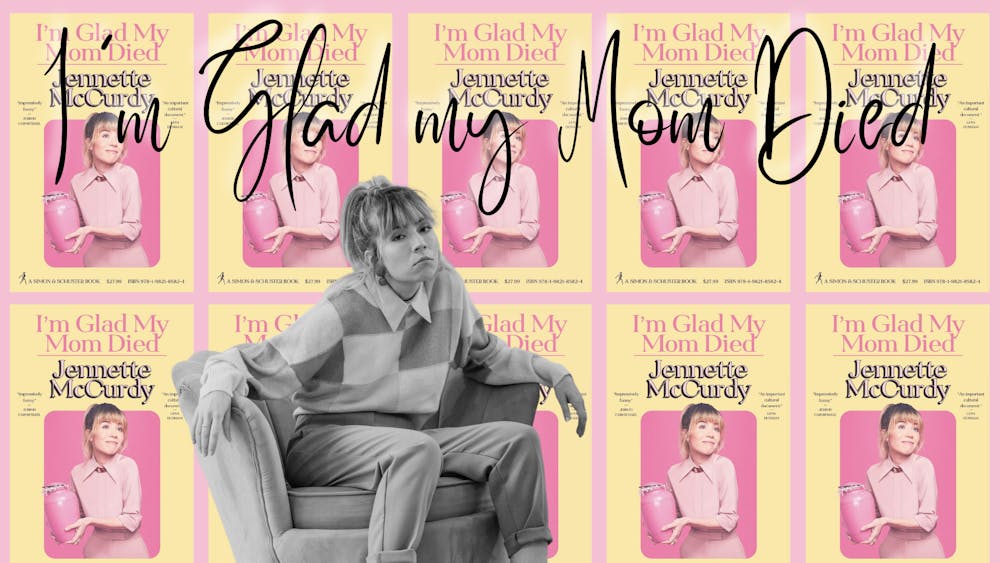Content warning: The following article includes mentions of eating disorders and can be disturbing or triggering for some readers. Please find resources listed at the bottom of the article.
From the black eyeliner and growing pains of Greta Gerwig’s Lady Bird to the musical comedy Mamma Mia!, the bond between a mother and daughter on screen is sensationalized as an almost divine connection. But not for Jennette McCurdy: After her mother forced her into the realm of film and television, she's only proven this fantasy wrong.
McCurdy’s first book, I’m Glad My Mom Died, is a cleverly self–aware but excruciating memoir about the Bermuda Triangle of relationships in her life: acting, her mother, and food. Almost a decade after the final episode of the Nickelodeon sitcom iCarly (which she starred in) aired, McCurdy makes it clear that the kids who grew up watching her are now old enough to read the truth behind the scenes.
It was McCurdy’s mom who wanted to be the actress. But after being diagnosed with unpredictable breast cancer, her daughter inherited the empty dream. McCurdy writes, “My life purpose has always been to make Mom happy, to be what she wants me to be.” With this, McCurdy’s book represents a desperate hunger for identity after a childhood of calling her mother’s wants her own and mastering the fake faces of performing. However, with rejection from the acting industry and her mother’s unreachable approval, this combination spiraled into uncontrollable self–hatred.
After booking a series of jobs, a young McCurdy thought that puberty would keep her from “fitting” into roles for child actors. Her mom said, “Well, sweetheart, if you really want to know how to stay small, there’s this secret thing you can do … it’s called calorie restriction.” McCurdy describes the daily measuring of her thighs to meals made of sugar–free popsicles until it prompted concern from teachers. She recalls, “This is the first time I’ve heard the word ‘anorexia.’ It sounds like a dinosaur,” a line weighed with youthful innocence.
McCurdy writes of her mother’s manipulation with heartbreaking gullibility, physically leaving room for only her feelings on the page, with no space to question them. Her mother coated demands with gaslighting praise with phrases like, “We are so connected,” or being offended when her favorite color was not the same as hers. Her mom bathed her until she was 16 years old and put the pressure of financially upholding their family onto McCurdy. She revered her mother as “my one true love” until their dynamic became parasitic and codependent. She would compromise, “Mom wants this more than anything, not me. This day was stressful and not fun, and if given the choice, I would choose to never do anything like it again. On the other hand, I do want what Mom wants, so she’s kind of right.”
After creating her acting career from scratch, McCurdy finally gets the call that she’s been cast in the new sitcom iCarly, which would become seven years at Nickelodeon over the course of two television shows and multiple movies. Some of the book’s most disturbing but expected discoveries are of Dan Schneider, the reigning producer over Nickelodeon who has since left after accusations of abuse of young actors. McCurdy exposes how he offered her alcohol when she was underage and sexualized her through revealing costumes. She writes, “I don’t want to look sexual. I want to look like a child.” The studio offered almost half a million dollars in hush money regarding Schneider’s behavior, which she refused. Now, McCurdy tells us—the channel's former viewers—that our childhoods were run by a child predator.
McCurdy’s memoir, regardless of where you are along the timeline of her life, leaves hints of both cries for help and warnings—especially with word choice that she uses to represent her maturity. When her time at iCarly begins, she uses “The Creator” as a pseudonym for Dan Schneider. However, as the book progresses, she reduces the worshipping vocabulary to simply “Dan.” In a similar way, McCurdy nicknames the mental voice feeding her uncontrollable rituals and thoughts “the Holy Ghost,” until finally referring to it as her “OCD.”
As her final moments at Nickelodeon overlap with the end of her mother’s life, McCurdy’s sarcasm and irony aggressively tears down the curtain of what we saw on our living room TVs. Her writing is cynical yet sentimental as she describes scenes from her life between the laugh tracks: holding her mother’s hand in a hospital bed as a billboard for iCarly of her smiling face hovers in the window outside. After her mother’s death, McCurdy’s battle with bulimia is where her writing feels like it crawls into your own stomach through the acidic and precarious descriptions of her body. When she finally seeks therapy, she realizes when answering her therapist's questions: “I have no idea how I’m supposed to be answering to make Mom look good.”
After a vow to never visit her mother’s grave and a hard no to the 2021 iCarly reboot later, McCurdy’s book is one staggering step toward self–definition for the first time.
Campus Resources:
The HELP Line: 215-898-HELP: A 24–hour–a–day phone number for members of the Penn community who seek help in navigating Penn's resources for health and wellness.
Counseling and Psychological Services: 215-898-7021 (active 24/7): The counseling center for the University of Pennsylvania.
Student Health Service: 215-746-3535: Student Health Service can provide medical evaluations and treatment to victims/survivors of eating disorders, regardless of whether they make a report or seek additional resources.
Reach–A–Peer Hotline: 215-573-2727 (every day from 9 p.m. to 1 a.m., texting available 24/7): A peer hotline to provide peer support, information, and referrals to Penn students.

